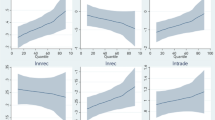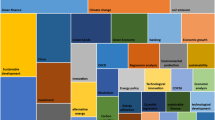Abstract
This article investigates the effects of sustainable power source, Foreign Direct Investment, International exchange, and Tourism on carbon outflow in five developed countries (i.e., Singapore, Qatar, Malaysia, South Korea, and Japan) and five developing countries (i.e., Pakistan, Bangladesh, Srilanka, China, and Indonesia) of Asia for the period 2000 to 2020 by utilizing System GMM, FMOLS, and DOLS models. The GMM framework shows that the outside direct speculation and the travel industry increase the discharge, while the renewable vitality utilization and universal exchange diminish the carbon outflow in technologically advanced nations. Sustainable power source utilization, the travel industry, and worldwide trade increase the emanation, while remote direct speculation decreases carbon outflow in developed countries. In contrast, the travel industry, financial development, and exchange transparency diminish CO2 outflows in developed nations. FDI, travel industry, and worldwide exchange are the significant drivers to build carbon discharge, while sustainable power source utilization and financial development fundamentally announce carbon outflows in developing nations. This investigation has significant proposals that the natural quality could be upgraded by expanding sustainable power source utilization, pull in FDI, advancing the travel industry arrangements, and exchange receptiveness.
Similar content being viewed by others
References
Al-mulali U, Fereidouni HG, Lee JY (2014) Electricity consumption from renewable and non-renewable sources and economic growth: evidence from Latin American countries. Renew Sust Energ Rev 30:290–298
Apergis N, Payne JE (2014) Renewable energy, output, CO2 emissions, and fossil fuel prices in Central America: evidence from a nonlinear panel smooth transition vector error correction model. Energy Econ 42:226–232
Bilan Y, Streimikiene D, Vasylieva T, Lyulyov O, Pimonenko T, Pavlyk A (2019) Linking between renewable energy, CO2 emissions, and economic growth: challenges for candidates and potential candidates for the EU membership. Sustainability 11(6):1528
Breitung J (2001) The local power of some unit root tests for panel data, in nonstationary panels, panel co-integration, and dynamic panels. Emerald Group Publishing Limited :161-177
Chen L, Thapa B, Yan W (2018) The relationship between tourism, carbon dioxide emissions, and economic growth in the Yangtze River Delta, China. Sustainability 10(7):2118
Dogan E, Turkekul B (2016) CO2 emissions, real output, energy consumption, trade, urbanization and financial development: testing the EKC hypothesis for the USA. Environ Sci Pollut Res 23(2):1203–1213
Hadri K (2000) Testing for stationarity in heterogeneous panel data. Econ J 3(2):148–161
Hanpattanakit P, Pimonsree L, Jamnongchob A, Boonpoke A (2018) CO2 emission and reduction of tourist transportation at Kok Mak Island, Thailand. Chem Eng Trans 63:37–42
Jebli MB, Youssef SB (2015) The environmental Kuznets curve, economic growth, renewable and non-renewable energy, and trade in Tunisia. Renew Sust Energ Rev 47:173–185
Jebli MB, Youssef SB, Ozturk I (2016) Testing environmental Kuznets curve hypothesis: the role of renewable and non-renewable energy consumption and trade in OECD countries. Ecol Indic 60:824–831
Jebli MB, Youssef SB, Apergis N (2019) The dynamic linkage between renewable energy, tourism, CO2 emissions, economic growth, foreign direct investment, and trade. Latin American Economic Review 28(1):2
Katircioglu ST (2009) Revisiting the tourism-led-growth hypothesis for Turkey using the bounds test and Johansen approach for co-integration. Tour Manag 30(1):17–20
Katircioglu ST, Feridun M, Kilinc C (2014) Estimating tourism-induced energy consumption and CO2 emissions: the case of Cyprus. Renew Sust Energ Rev 29:634–640
Katircioglu S, Saqib N, Katircioglu S, Kilinc CC, Gul H (2020) Estimating the effects of tourism growth on emission pollutants: empirical evidence from a small island, Cyprus. Air Quality, Atmosphere & Health 13:391–397
Law SH, Azman-Saini W (2012) Institutional quality, governance, and financial development. Econ Gov 13(3):217–236
Levin A, Lin CF, Chu CS (2002) Unit root tests in panel data: asymptotic and finite-sample properties. J Econ 108(1):1–24
Li Z, Dong H, Huang Z, Failler P (2019) Impact of foreign direct investment on environmental performance. Sustainability 11(13):3538
Mahrinasari M, Haseeb M, Ammar J (2019) Is trade liberalization a hazard to sustainable environment?: fresh insight from ASEAN countries. Pol J Manag Stud 19
Menyah K, Wolde-Rufael Y (2010) Energy consumption, pollutant emissions and economic growth in South Africa. Energy Econ 32(6):1374–1382
NGUYEN AT (2019) The relationship between economic growth, energy consumption and carbon dioxide emissions: evidence from Central Asia. Eurasian Journal of Business and Economics 12(24):1–15
Ocal O, Aslan A (2013) Renewable energy consumption–economic growth nexus in Turkey. Renew Sust Energ Rev 28:494–499
Pedroni P (2004) Panel co-integration: asymptotic and finite sample properties of pooled time series tests with an application to the PPP hypothesis. Econometric Theory 20(3):597–625
Qi X, Han Y, Kou P (2020) Population urbanization, trade openness and carbon emissions: an empirical analysis based on China air quality, Atmosphere & Health
Sadorsky P (2009) Renewable energy consumption, CO2 emissions and oil prices in the G7 countries. Energy Econ 31(3):456–462
Salahuddin M, Alam K, Ozturk I, Sohag K (2018) The effects of electricity consumption, economic growth, financial development and foreign direct investment on CO2 emissions in Kuwait. Renew Sust Energ Rev 81:2002–2010
Shafiei S, Salim RA (2014) Non-renewable and renewable energy consumption and CO2 emissions in OECD countries: a comparative analysis. Energy Policy 66:547–556
Shujah-ur-R, Chen S, Saleem N. Saud S, Ahmad A, Ahmad F (2020) Potential influential economic indicators and environmental quality: insights from the MERCOSUR economies. Air Quality, Atmosphere & Health
To AH, Ha DT, Nguyen HM, Vo DH (2019) The impact of foreign direct investment on environment degradation: evidence from emerging markets in Asia. Int J Environ Res Public Health 16(9):1636
Tugcu CT, Topcu M (2018) Total, renewable and non-renewable energy consumption and economic growth: revisiting the issue with an asymmetric point of view. Energy 152:64–74
Zhu H, Duan L, Guo Y, Yu K (2016) The effects of FDI, economic growth and energy consumption on carbon emissions in ASEAN-5: evidence from panel quantile regression. Econ Model 58:237–248
Code availability
All results reported in this research were carried out in R-studio with the help of the “PLM”.
package available online: https://cran.rproject.org/web/packages/plm/vignettes/plmpackage.html
Funding
The research was supported by the National Natural Science Foundation of China (Grant Nos. 11971142, 11871202, 61673169, 11701176, 11626101, 11601485).
Author information
Authors and Affiliations
Contributions
Y. A. Khan, Y. M. Chu, and S. Z. Abbas designed research; Y. A. K and S. Z. Abbas performed the research; Y. A. Khan, M. Ahmad analyzed the data; and Y. A. Khan, M. Ahmad, and M. A. Haider wrote the paper.
Corresponding author
Ethics declarations
Conflict of interest
The authors declare that they have no conflict of interest.
Ethics approval
This article does not contain any studies with human participants performed by any of the authors.
Additional information
Publisher’s note
Springer Nature remains neutral with regard to jurisdictional claims in published maps and institutional affiliations.
Rights and permissions
About this article
Cite this article
Khan, Y.A., Abbas, S.Z., Chu, Y.M. et al. Study of environmental dynamic through optimized potential variables: renewable energy. Air Qual Atmos Health 13, 1127–1134 (2020). https://doi.org/10.1007/s11869-020-00869-9
Received:
Accepted:
Published:
Issue Date:
DOI: https://doi.org/10.1007/s11869-020-00869-9




